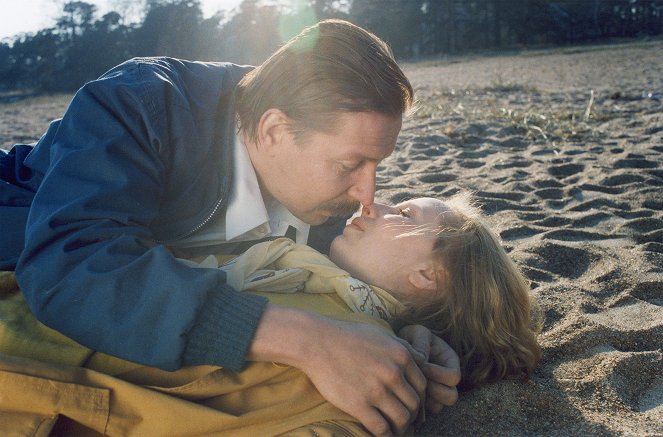Directed by:
Aki KaurismäkiScreenplay:
Aki KaurismäkiCinematography:
Timo SalminenCast:
Matti Pellonpää, Kati Outinen, Sakari Kuosmanen, Esko Nikkari, Kylli Köngäs, Pekka Laiho, Jukka-Pekka Palo, Svante Korkiakoski, Safka Pekkonen (more)VOD (1)
Plots(1)
Nikander (Matti Pellonpää) is stuck in a dead end job as a garbage man. His life is lonely and unsatisfying until he strikes up an uneasy romance with Ilona (Kati Outinen), an embittered unemployed former store clerk. (official distributor synopsis)
Reviews (3)
A love story from a backyard for trash cans. The best thing about Shadows in Paradise is that Kaurismäki continuously makes irony out of the elements of the genre and the absolute resignation of strong emotions. Both Outinen and Pellonpää primarily speak with their eyes. The humor is absolutely unforced here, which is actually something that is easy to overlook, because it results from the interplay of many components. In this, Kaurismäki is uniquely refined - although he works with simple means, it is their harmony (and confrontation with expectations) that brings together a charming mixture of exaggeration, naivety, laconic frowning, social criticism and nickel-and-dime romance. It is also remarkable how tightly, "small" and cozy this yard feels, even if it plays with completely archetypal stories of unfulfilled love and escaping from existential gray. Love simply blooms everywhere, even in a dumpster. Kaurismäki discovered its scent amid the smell of rotting garbage.
()
Shadows in Paradise could be characterized as a "proletarian romance" - but only if that were true. It is definitely not a film about mutual love, and labeling the film as a romance either means not understanding the rules of the genre, or what happens between the central couple. I have a feeling that even the director himself was not clear about the protagonists he created and where their relationship was heading. Nikander is a fool, inexperienced, and clumsy in relationships. Kaurismäki later exaggerated this type of character into absurdity in a subsequent film. Ilona has a very practical approach to relationships and never reached a state of falling in love with Nikander during any phase of their "interaction." In the beginning, there was a desire to have fun, but later a pragmatic inclination toward someone who could and wanted to offer more. Unlike the naive and manipulable Nikander, the lover from the middle class did not change Ilona's social status. Therefore, the final scene cannot be perceived as a traditional happy ending, certainly not for Nikander. Kaurismäki has always been known for his economical dialogues. Either they did not work for him, or he underestimated them. Here, the dialogic minimalism combined with "naive" acting, which the director traditionally requires from his actors, leads to the characters appearing somewhat retarded or at least temporarily "out of it." Even the endless cigarette stubs (almost everyone smokes almost everywhere, similar to early Fassbinder films) now seem strangely unnatural. I classify the film as one of Kaurismäki's works that did not impress me but also did not disgust me, and my overall impression is 55%.
()
A very successful beginning of collaboration between Aki Kaurismäki and Kati Outinen, whom I have grown to admire in his films. Here she was still quite young, and most of the time her expression suggested that she had everything under control. Then it's hard to win someone's heart, and the chosen one doesn't necessarily have to be a garbage collector. I just had to succumb to such a love story imbued with austere and succinct dialogues, served by Aki Kaurismäki with masterful exaggeration.
()


Ads